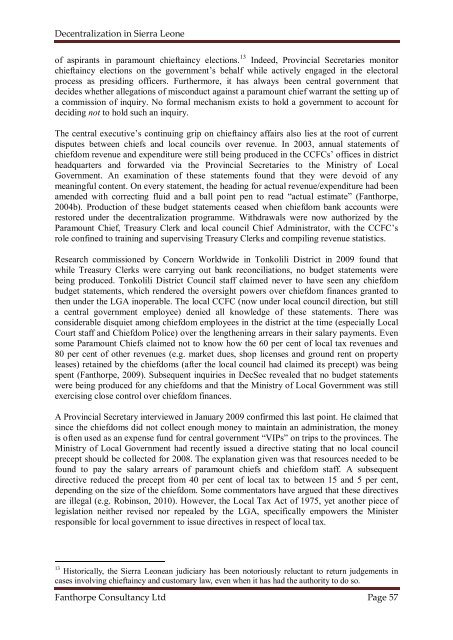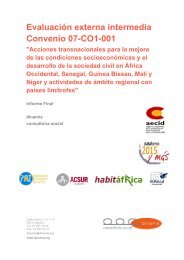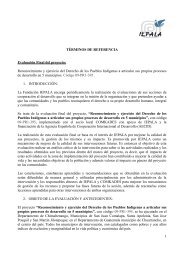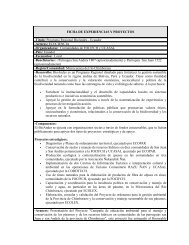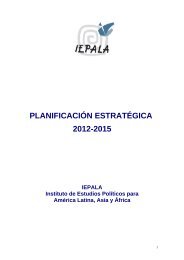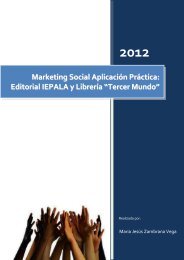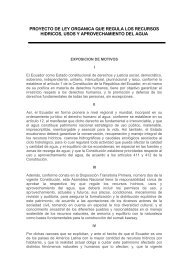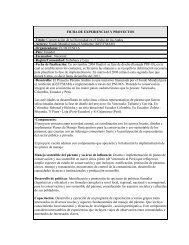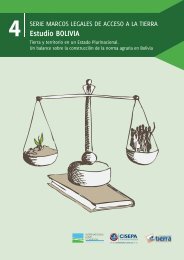Decentralization in Sierra Leone - Research for Development
Decentralization in Sierra Leone - Research for Development
Decentralization in Sierra Leone - Research for Development
Create successful ePaper yourself
Turn your PDF publications into a flip-book with our unique Google optimized e-Paper software.
<strong>Decentralization</strong> <strong>in</strong> <strong>Sierra</strong> <strong>Leone</strong>of aspirants <strong>in</strong> paramount chiefta<strong>in</strong>cy elections. 13 Indeed, Prov<strong>in</strong>cial Secretaries monitorchiefta<strong>in</strong>cy elections on the government’s behalf while actively engaged <strong>in</strong> the electoralprocess as presid<strong>in</strong>g officers. Furthermore, it has always been central government thatdecides whether allegations of misconduct aga<strong>in</strong>st a paramount chief warrant the sett<strong>in</strong>g up ofa commission of <strong>in</strong>quiry. No <strong>for</strong>mal mechanism exists to hold a government to account <strong>for</strong>decid<strong>in</strong>g not to hold such an <strong>in</strong>quiry.The central executive’s cont<strong>in</strong>u<strong>in</strong>g grip on chiefta<strong>in</strong>cy affairs also lies at the root of currentdisputes between chiefs and local councils over revenue. In 2003, annual statements ofchiefdom revenue and expenditure were still be<strong>in</strong>g produced <strong>in</strong> the CCFCs’ offices <strong>in</strong> districtheadquarters and <strong>for</strong>warded via the Prov<strong>in</strong>cial Secretaries to the M<strong>in</strong>istry of LocalGovernment. An exam<strong>in</strong>ation of these statements found that they were devoid of anymean<strong>in</strong>gful content. On every statement, the head<strong>in</strong>g <strong>for</strong> actual revenue/expenditure had beenamended with correct<strong>in</strong>g fluid and a ball po<strong>in</strong>t pen to read “actual estimate” (Fanthorpe,2004b). Production of these budget statements ceased when chiefdom bank accounts wererestored under the decentralization programme. Withdrawals were now authorized by theParamount Chief, Treasury Clerk and local council Chief Adm<strong>in</strong>istrator, with the CCFC’srole conf<strong>in</strong>ed to tra<strong>in</strong><strong>in</strong>g and supervis<strong>in</strong>g Treasury Clerks and compil<strong>in</strong>g revenue statistics.<strong>Research</strong> commissioned by Concern Worldwide <strong>in</strong> Tonkolili District <strong>in</strong> 2009 found thatwhile Treasury Clerks were carry<strong>in</strong>g out bank reconciliations, no budget statements werebe<strong>in</strong>g produced. Tonkolili District Council staff claimed never to have seen any chiefdombudget statements, which rendered the oversight powers over chiefdom f<strong>in</strong>ances granted tothen under the LGA <strong>in</strong>operable. The local CCFC (now under local council direction, but stilla central government employee) denied all knowledge of these statements. There wasconsiderable disquiet among chiefdom employees <strong>in</strong> the district at the time (especially LocalCourt staff and Chiefdom Police) over the lengthen<strong>in</strong>g arrears <strong>in</strong> their salary payments. Evensome Paramount Chiefs claimed not to know how the 60 per cent of local tax revenues and80 per cent of other revenues (e.g. market dues, shop licenses and ground rent on propertyleases) reta<strong>in</strong>ed by the chiefdoms (after the local council had claimed its precept) was be<strong>in</strong>gspent (Fanthorpe, 2009). Subsequent <strong>in</strong>quiries <strong>in</strong> DecSec revealed that no budget statementswere be<strong>in</strong>g produced <strong>for</strong> any chiefdoms and that the M<strong>in</strong>istry of Local Government was stillexercis<strong>in</strong>g close control over chiefdom f<strong>in</strong>ances.A Prov<strong>in</strong>cial Secretary <strong>in</strong>terviewed <strong>in</strong> January 2009 confirmed this last po<strong>in</strong>t. He claimed thats<strong>in</strong>ce the chiefdoms did not collect enough money to ma<strong>in</strong>ta<strong>in</strong> an adm<strong>in</strong>istration, the moneyis often used as an expense fund <strong>for</strong> central government “VIPs” on trips to the prov<strong>in</strong>ces. TheM<strong>in</strong>istry of Local Government had recently issued a directive stat<strong>in</strong>g that no local councilprecept should be collected <strong>for</strong> 2008. The explanation given was that resources needed to befound to pay the salary arrears of paramount chiefs and chiefdom staff. A subsequentdirective reduced the precept from 40 per cent of local tax to between 15 and 5 per cent,depend<strong>in</strong>g on the size of the chiefdom. Some commentators have argued that these directivesare illegal (e.g. Rob<strong>in</strong>son, 2010). However, the Local Tax Act of 1975, yet another piece oflegislation neither revised nor repealed by the LGA, specifically empowers the M<strong>in</strong>isterresponsible <strong>for</strong> local government to issue directives <strong>in</strong> respect of local tax.13 Historically, the <strong>Sierra</strong> <strong>Leone</strong>an judiciary has been notoriously reluctant to return judgements <strong>in</strong>cases <strong>in</strong>volv<strong>in</strong>g chiefta<strong>in</strong>cy and customary law, even when it has had the authority to do so.Fanthorpe Consultancy Ltd Page 57


